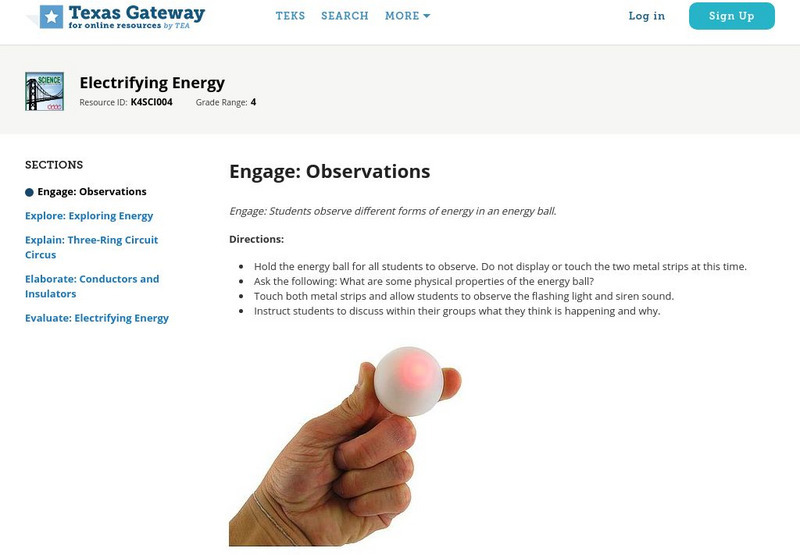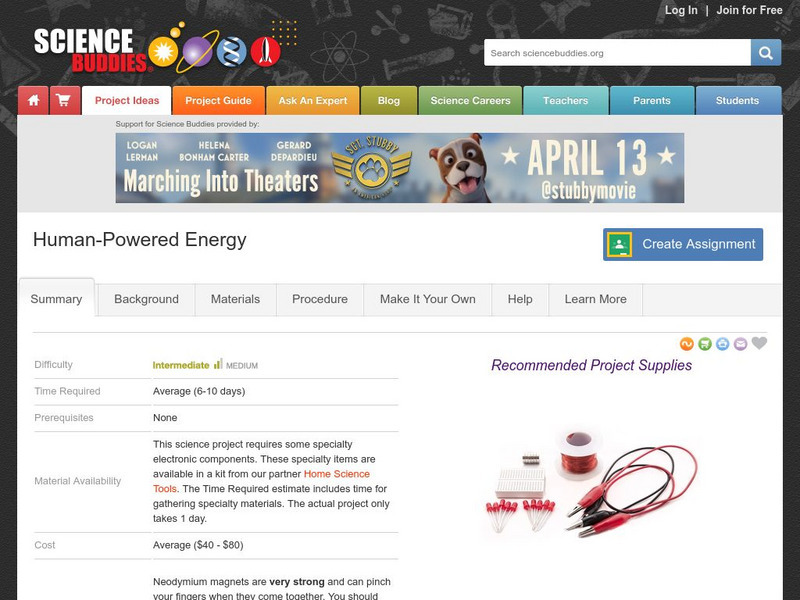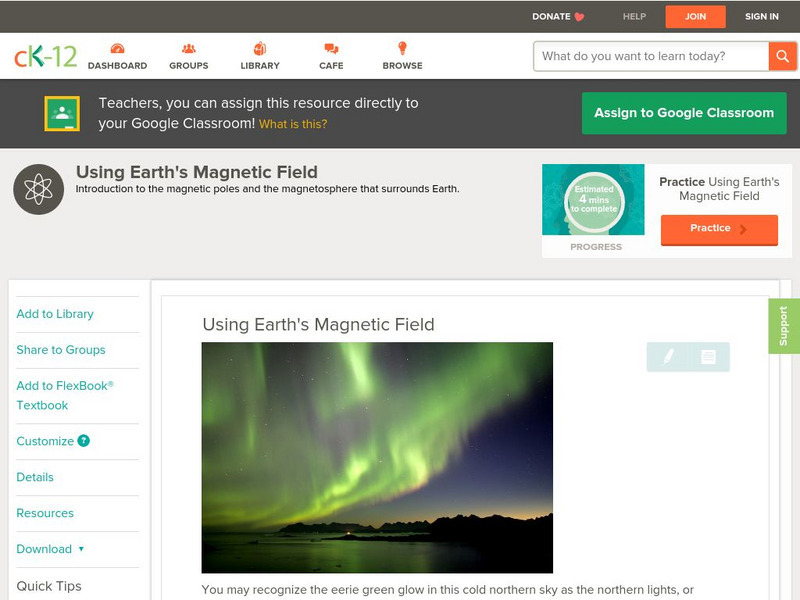Hi, what do you want to do?
Curated OER
Amazing Planet DVD-Video Assignment
For this geography skills worksheet, students watch the National Geographic video "Amazing Planet." Students then respond to 13 short answer questions about the content of the video.
Curated OER
Meteors
Students identify the different types of meteorite using an interactive website. In this earth science lesson, students simulate how meteors crash on a surface. They relate meteor size to crater size.
Curated OER
In Search of Cosmic Rays
Students compare rates to altitude. They conduct a class discussion about the results.
Curated OER
Physics Post-Lab
Students explore physics. In this science instructional activity, students discuss physics in their everyday lives. Students complete a physics worksheet.
Curated OER
Powered Up About Electricity!
Students study the process of turning coal into electricity. In this electricity activity, students are guided by their teacher through the steps required to turn coal into electricity. Students complete a worksheet answering questions...
Massachusetts Institute of Technology
Mit: Open Course Ware: Courses: Physics: Electricity and Magnetism
College-level physics course highlighting electromagnetism. This course also includes a wide variety of other physics topics including lightning, electrocardiograms, metal detectors, and atom smashers, to name a few. Course includes a...
Science Struck
Science Struck: The 13 Types of Energy and Their Applications
Read about all the different kinds of potential and kinetic energy. Includes energy formulas and examples of energy applications.
Science Struck
Science Struck: Electromagnetic Energy and Why It Is Important
Explains what electromagnetic energy is, the history of its discovery, some terms used when talking about it, and gives some facts about it.
Concord Consortium
Concord Consortium: Stem Resources: Heat and Light From Electricity
Understand the energy transformations that happens when you light a bulb with a battery. Activity requires students to build a simple circuit and take temperature and time measurements. Lab includes procedure with questions that can be...
Georgia State University
Georgia State University: Hyper Physics: Potential Energy
This site from Georgia State University Physics Department defines and explains the concept of potential energy. Using equations and graphics to illustrate the idea, it discusses the many types of potential energy (gravitational,...
BBC
Bbc: Gcse Bitesize: Physics (Combined Science)
This site provides a list of the topics and links to the Physics (Combined Science)courses offered in GCSE Bitesize and a list of contents of each. The topics include the following: Energy, Electricity, Matter, Radioactivity, Forces,...
Texas Education Agency
Texas Gateway: Electrifying Energy
This tutorial reviews over electrical energy.
Science Buddies
Science Buddies: Shaking Up Some Energy
Shake N' Light flashlights have been advertised on televisions across the nation in the recent year. But many do not understand just how they get energy to light up the bulb without using batteries. Do this experiment to make your own...
National High Magnetic Field Laboratory
Magnet Academy: Svante Arrhenius
Svante Arrhenius was born in Vik, Sweden, and became the first native of that country to win the Nobel Prize. The award for chemistry was bestowed to him in honor of his theory of electrolytic dissociation. Arrhenius also developed the...
TryEngineering
Try Engineering: Flashlights and Batteries
Students work in teams to explore how a flashlight works. This activity examines the topics of batteries, electron flow, circuit systems, switches, and bulbs.
Other
Hes Energy Net: Energy Use and Delivery: Lesson Plan 3.3: Electromagnets [Pdf]
For this lesson, students learn how to identify and explain an electromagnet, describe the relationship between electricity and magnetism, and compare an electromagnet to a bar magnet.
University of Oregon
Magnet Lab: University of Oregon Virtual Laboratory
The collection of interactive physics applets offered by the University of Oregon is an excellent resource for students. The applets are grouped in broad subject areas including astrophysics, energy and environment, mechanics and...
Energy for Sustainable Development
Esd Bulgaria: Kids & Energy: Electricity
Electricity is the flow of electrical power or charge. It is a secondary energy source which means that we get it from the conversion of other sources of energy, like coal, natural gas, oil, nuclear power and other natural sources, which...
US Department of Energy
Fus Ed Web: Physics of a Fundamental Energy Source
An excellent resource on nuclear fusion! Using incredible graphics and excellent discussion, this site (with its several pages) provides an exhaustive online course on the topic. Click on the link for "a Guided Tour" and begin.
National High Magnetic Field Laboratory
Magnet Academy: Fluorescent Lamp 1934
Compared to incandescent lamps, fluorescent lamps last longer, require less energy and produce less heat, advantages resulting from the different way in which they generate light.
PBS
Pbs Learning Media: Solar House
In this What's Up in the Environment? video segment, an electrical engineer in Virginia and his 13-year-old son explain how they produce electricity in their home. [3:58]
US Energy Information Administration
U.s. Eia Energy Kids: Energy Sources: Electricity
A basic description of electricity and the role it plays in everyday life.
Scholastic
Scholastic: Study Jams! Science: Energy, Light and Sound: Magnetism
A slideshow and a short multiple-choice quiz on the basic concepts and vocabulary of magnetism.
CK-12 Foundation
Ck 12: Physical Science: Using Earth's Magnetic Field
[Free Registration/Login may be required to access all resource tools.] The Earth's magnetic field and how it protects life on Earth, and how it is used for navigation.






















